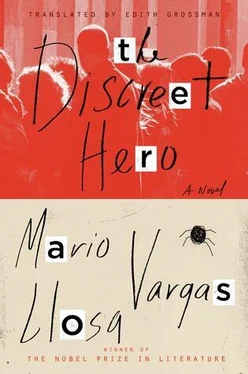“Mabel’s turned up, Lituma. She’s in her house in Castilla. Let’s go, run. Didn’t I tell you? They swallowed the story! They let her go!”
“This certainly is a surprise,” Father O’Donovan exclaimed when he saw Rigoberto come into the sacristy where the priest had just removed the chasuble he’d worn to celebrate eight o’clock Mass. “Fancy seeing you here, Ears. What a long time it’s been. I can’t believe it.”
He was tall and stout, a jovial bald man with kind eyes that sparkled behind tortoiseshell glasses. He seemed to take up all the space in the small room with its shabby, faded walls and chipped floor; daylight came in through a Theatine window hung with cobwebs.
They embraced with their old affection; they hadn’t seen each other for months, perhaps a year. In the Academy of La Recoleta, where they’d both been students from the first year of primary school to the fifth year of secondary school, they had been very good friends and for one year had even shared the same desk. Then, when both matriculated at the Universidad Católica to study law, they continued to see a good deal of each other. They joined Acción Católica, took the same courses, studied together. Until one fine day Pepín O’Donovan gave his friend Rigoberto the surprise of his life.
“Don’t tell me that your showing up here is because you’ve converted and have come to make your confession, Ears,” Father O’Donovan said mockingly, leading him by the arm to his small office in the church. He offered him a seat. There were bookcases, books, pamphlets, a crucifix, a photograph of the pope, and another of Pepín’s parents. A piece of the ceiling had fallen, revealing the mix of ditch reeds and clay with which it had been constructed. Was this church a colonial relic? It was in ruins and could collapse at any moment.
“I’ve come to see you because I need your help, it’s that simple.” Rigoberto dropped into the chair that creaked under his weight and exhaled, overwhelmed. Pepín was the only person who still called him by his school nickname: Ears. In his adolescence, it had made him self-conscious. Not now.
That morning in the cafeteria at the Universidad Católica, at the beginning of the second year of law school, when Pepín O’Donovan suddenly announced — as casually as if he were discussing a class in civil law and principles, or the last Clásico match between Alianza and the U — that they wouldn’t see each other for a while because he was leaving that night for Santiago de Chile to begin his novitiate, Rigoberto thought his friend was joking. “Do you mean you’re going to become a priest? Don’t kid around, man.” True, both had joined Acción Católica, but Pepín had never even hinted to Ears that he’d heard the call. What he was telling him now was no joke but a deeply considered decision made in solitude and silence, over many years. Rigoberto learned afterward that Pepín had faced many problems with his parents, that his family tried everything to dissuade him from entering the seminary.
“Yes, man, of course,” said Father O’Donovan. “If I can give you a hand, I’d be happy to, Rigoberto, that goes without saying.”
Pepín had never been one of those overly pious boys who took communion at every Mass at school, the ones the priests flattered and tried to convince that they had a vocation, that God had chosen them for the priesthood. He was the most normal boy in the world, athletic, fond of parties, mischievous, and for a time he’d even had a girlfriend, Julieta Mayer, a freckled volleyball player who studied at the Academy of Santa Úrsula. He fulfilled his obligations by going to Mass, like all the students at La Recoleta, and he’d been a fairly diligent member of Acción Católica, but as far as Rigoberto could recall, no more devout than the others and not especially interested in the talks dedicated to religious vocations. He didn’t even attend the retreats the priests organized from time to time at a country house they had in Chosica. No, it wasn’t a joke but an irreversible decision. He’d felt the call from the time he was a boy and had thought it over carefully, not telling anyone before deciding to take the big step. Now there was no going back. That same night he left for Chile. The next time they saw each other, it was many years later: Pepín was already Father O’Donovan, dressed as a priest, wearing eyeglasses, prematurely bald, and beginning his career as a die-hard cyclist. He was still a simple, amiable person, so that every time they saw each other it had become a kind of running joke for Rigoberto to tell him: “Good to know you haven’t changed, Pepín, just as well that even though you are one, you don’t seem like a priest.” To which Pepín always responded by teasing Rigoberto with the nickname of his youth: “And those donkey’s accessories of yours are still growing, Ears. Why is that, I wonder?”
“It’s not about me,” Rigoberto explained, “it’s Fonchito. Lucrecia and I don’t know what to do with the boy, Pepín. He’s turning our hair gray, honestly.”
They’d continued to see each other with some frequency. Father O’Donovan married Rigoberto and Eloísa, his first wife, Fonchito’s late mother, and after he was widowed, Father O’Donovan also married him and Lucrecia in a small ceremony with only a handful of friends attending. He’d baptized Fonchito and occasionally visited the Barranco apartment, where he was received with great affection, to have lunch and listen to music. Rigoberto had helped him a few times with donations (his own and from the insurance company) for charitable work in the parish. When they saw each other, they tended to speak for the most part about music, which Pepín O’Donovan had always liked a great deal. From time to time Rigoberto and Lucrecia invited him to the concerts sponsored by the Philharmonic Society of Lima in the Santa Úrsula auditorium.
“Don’t worry, man, it’s probably nothing,” said Father O’Donovan. “At the age of fifteen, all the young people in the world have and make problems. And if they don’t, they’re fools. It’s normal.”
“The normal thing would be for him to get drunk, go out with easy girls, smoke some marijuana, do all the stupid things you and I did when we were teenagers,” said Rigoberto, in distress. “No, old man, that isn’t the route Fonchito’s taken. Instead, well, I know you’re going to laugh, but for some time now he’s gotten it into his head that he sees the devil.”
Father O’Donovan tried to control himself but couldn’t and burst into resounding laughter.
“I’m not laughing at Fonchito but at you,” he explained between gales of laughter. “At you, Ears, talking about the devil. That word sounds very strange in your mouth. It sounds dissonant.”
“I don’t know if he’s the devil, I never told you he is, I never used that word, I don’t know why you do, Papa,” Fonchito protested in a voice so faint that his father, in order not to miss a word he was saying, had to bend forward and bring his head close to the boy’s.
“All right, forgive me, son,” he apologized. “Just tell me one thing. I’m speaking to you very seriously, Fonchito. Do you feel cold each time Edilberto Torres appears? As if he’d brought an icy gust?”
“What silly things you’re saying, Papa.” Fonchito opened his eyes very wide, not sure whether to laugh or remain serious. “Are you kidding me or what?”
“Does he appear to him as the devil appeared to the famous Father Urraca, in the shape of a naked woman?” Father O’Donovan started to laugh again. “I suppose you’ve read that story by Ricardo Palma, Ears, it’s one of his most amusing.”
“Okay, it’s okay,” Rigoberto apologized again. “You’re right, you never told me this Edilberto Torres was the devil. I beg your pardon, I know I shouldn’t joke about this. The thing about the cold comes from a novel by Thomas Mann, where the devil appears to the main character, a composer. Forget my question. It’s just that I don’t know what to call this person, son. Someone who appears to you and disappears, who materializes in the most unexpected places, can’t be flesh and blood like you and me. Isn’t that so? I swear I’m not making fun of you. I’m speaking to you from the bottom of my heart. If he isn’t the devil, then he must be an angel.”
Читать дальше

![Гарри Гаррисон - Bill, the Galactic Hero [= The Starsloggers]](/books/87536/garri-garrison-bill-the-galactic-hero-the-star-thumb.webp)










